Developing Social Policies: A Case Study of Medically Supervised Injection Centre Policy in Australia
VerifiedAdded on 2023/06/18
|8
|1958
|85
AI Summary
This report discusses the policy process of Medically Supervised Injection Centre (MSIC) in Australia and its stages of confirmation. It presents a case study of MSIC policy development and evaluation for society's well-being and security. The report also highlights the importance of social policies in managing the welfare and security of society.
Contribute Materials
Your contribution can guide someone’s learning journey. Share your
documents today.
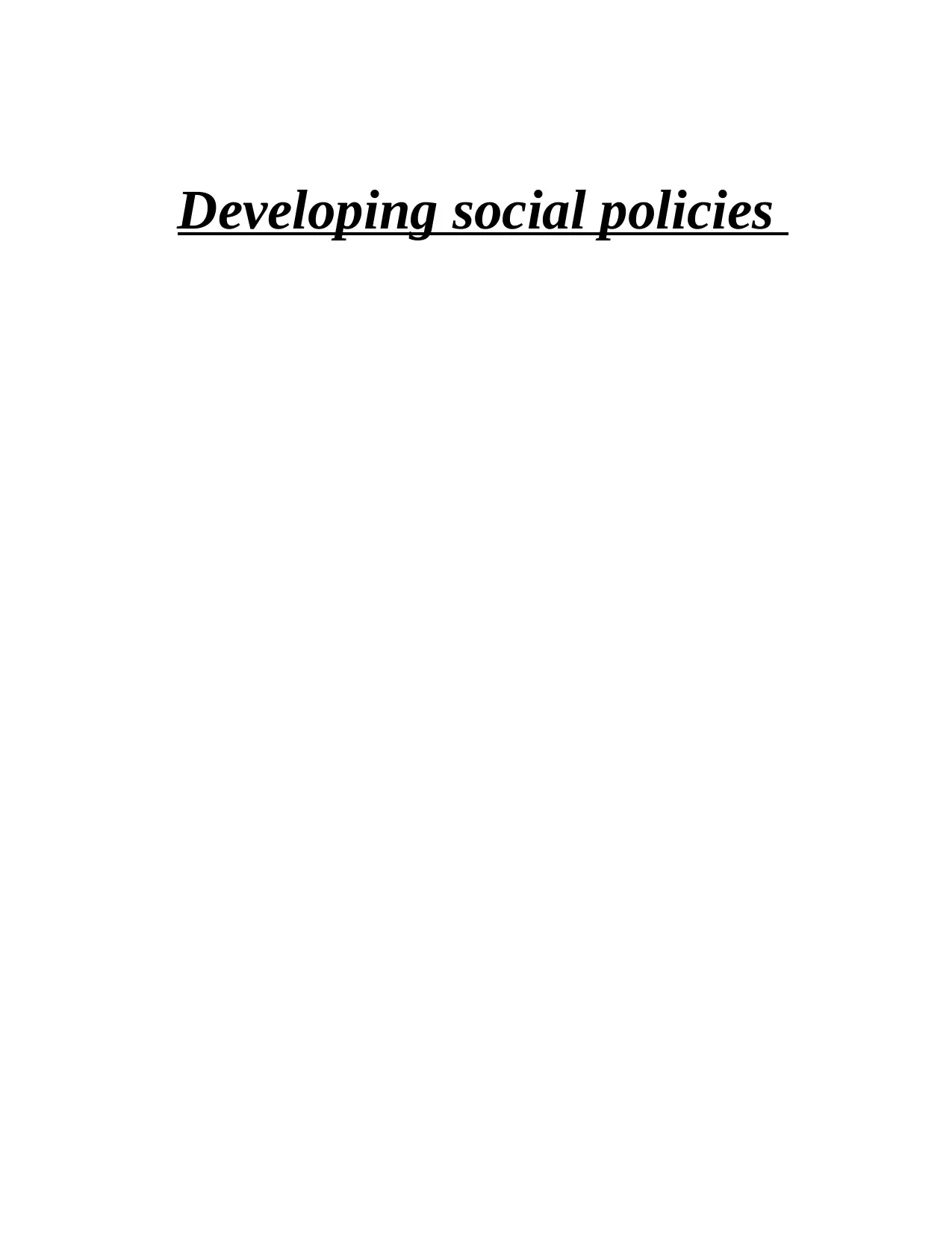
Developing social policies
Secure Best Marks with AI Grader
Need help grading? Try our AI Grader for instant feedback on your assignments.
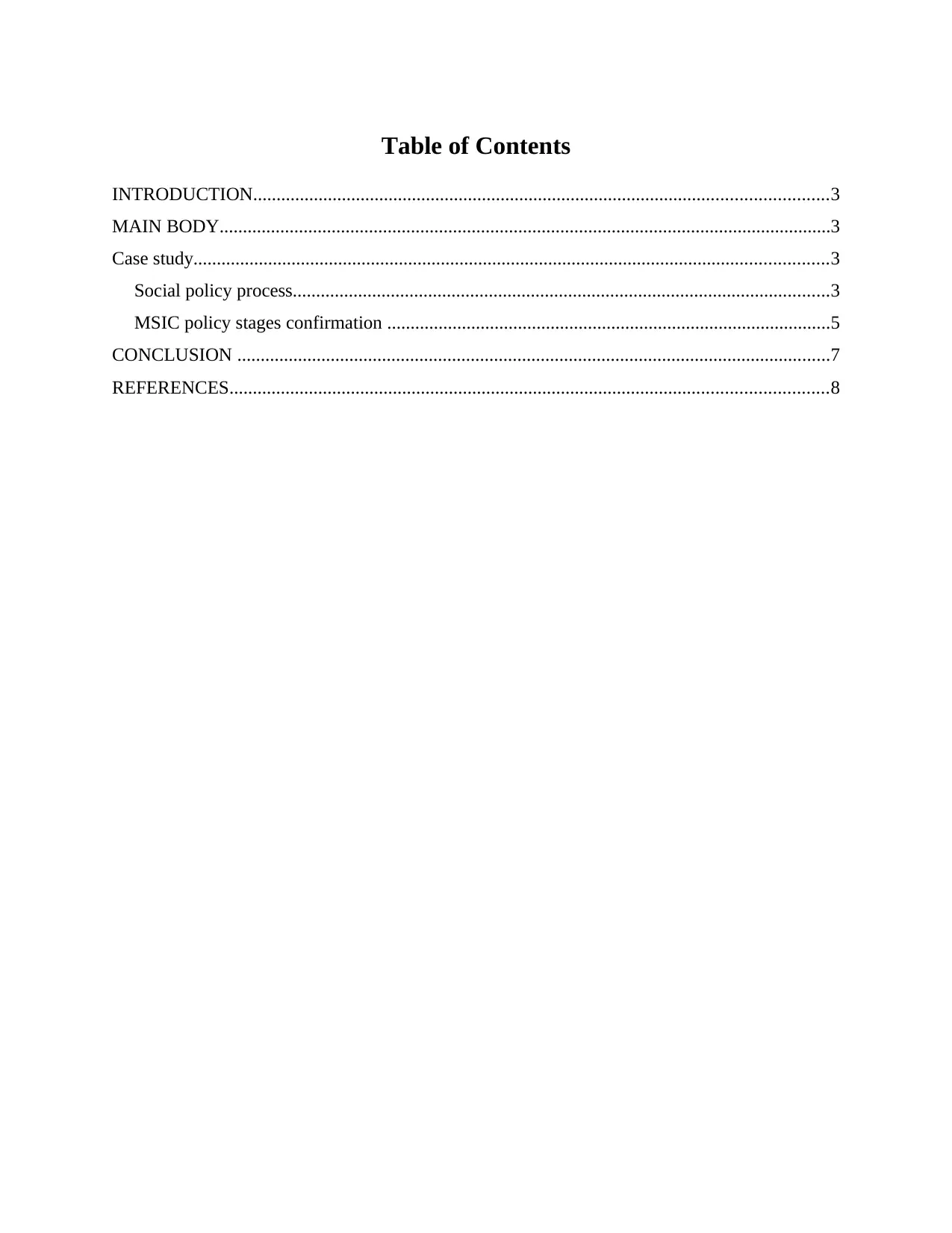
Table of Contents
INTRODUCTION...........................................................................................................................3
MAIN BODY...................................................................................................................................3
Case study........................................................................................................................................3
Social policy process...................................................................................................................3
MSIC policy stages confirmation ...............................................................................................5
CONCLUSION ...............................................................................................................................7
REFERENCES................................................................................................................................8
INTRODUCTION...........................................................................................................................3
MAIN BODY...................................................................................................................................3
Case study........................................................................................................................................3
Social policy process...................................................................................................................3
MSIC policy stages confirmation ...............................................................................................5
CONCLUSION ...............................................................................................................................7
REFERENCES................................................................................................................................8
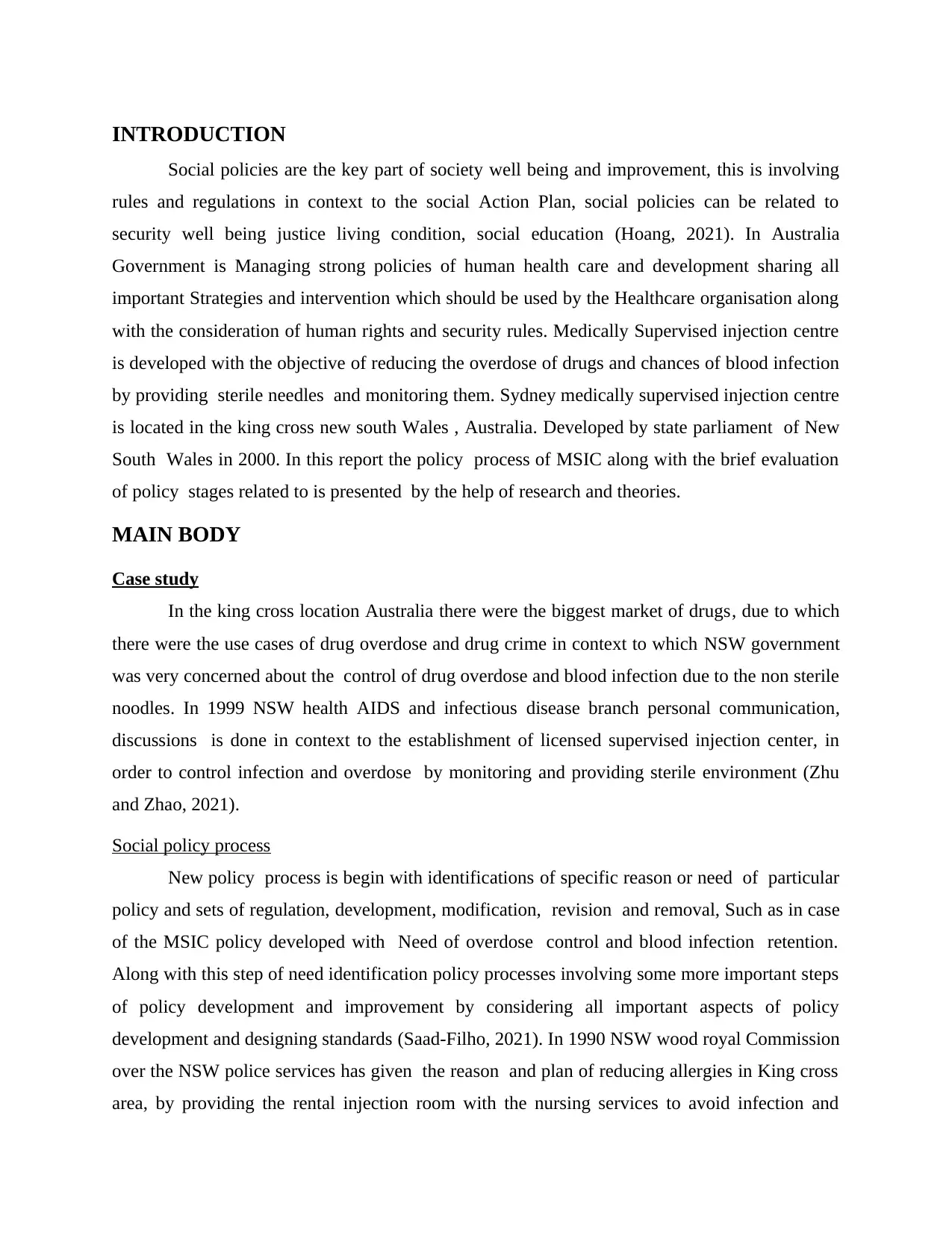
INTRODUCTION
Social policies are the key part of society well being and improvement, this is involving
rules and regulations in context to the social Action Plan, social policies can be related to
security well being justice living condition, social education (Hoang, 2021). In Australia
Government is Managing strong policies of human health care and development sharing all
important Strategies and intervention which should be used by the Healthcare organisation along
with the consideration of human rights and security rules. Medically Supervised injection centre
is developed with the objective of reducing the overdose of drugs and chances of blood infection
by providing sterile needles and monitoring them. Sydney medically supervised injection centre
is located in the king cross new south Wales , Australia. Developed by state parliament of New
South Wales in 2000. In this report the policy process of MSIC along with the brief evaluation
of policy stages related to is presented by the help of research and theories.
MAIN BODY
Case study
In the king cross location Australia there were the biggest market of drugs, due to which
there were the use cases of drug overdose and drug crime in context to which NSW government
was very concerned about the control of drug overdose and blood infection due to the non sterile
noodles. In 1999 NSW health AIDS and infectious disease branch personal communication,
discussions is done in context to the establishment of licensed supervised injection center, in
order to control infection and overdose by monitoring and providing sterile environment (Zhu
and Zhao, 2021).
Social policy process
New policy process is begin with identifications of specific reason or need of particular
policy and sets of regulation, development, modification, revision and removal, Such as in case
of the MSIC policy developed with Need of overdose control and blood infection retention.
Along with this step of need identification policy processes involving some more important steps
of policy development and improvement by considering all important aspects of policy
development and designing standards (Saad-Filho, 2021). In 1990 NSW wood royal Commission
over the NSW police services has given the reason and plan of reducing allergies in King cross
area, by providing the rental injection room with the nursing services to avoid infection and
Social policies are the key part of society well being and improvement, this is involving
rules and regulations in context to the social Action Plan, social policies can be related to
security well being justice living condition, social education (Hoang, 2021). In Australia
Government is Managing strong policies of human health care and development sharing all
important Strategies and intervention which should be used by the Healthcare organisation along
with the consideration of human rights and security rules. Medically Supervised injection centre
is developed with the objective of reducing the overdose of drugs and chances of blood infection
by providing sterile needles and monitoring them. Sydney medically supervised injection centre
is located in the king cross new south Wales , Australia. Developed by state parliament of New
South Wales in 2000. In this report the policy process of MSIC along with the brief evaluation
of policy stages related to is presented by the help of research and theories.
MAIN BODY
Case study
In the king cross location Australia there were the biggest market of drugs, due to which
there were the use cases of drug overdose and drug crime in context to which NSW government
was very concerned about the control of drug overdose and blood infection due to the non sterile
noodles. In 1999 NSW health AIDS and infectious disease branch personal communication,
discussions is done in context to the establishment of licensed supervised injection center, in
order to control infection and overdose by monitoring and providing sterile environment (Zhu
and Zhao, 2021).
Social policy process
New policy process is begin with identifications of specific reason or need of particular
policy and sets of regulation, development, modification, revision and removal, Such as in case
of the MSIC policy developed with Need of overdose control and blood infection retention.
Along with this step of need identification policy processes involving some more important steps
of policy development and improvement by considering all important aspects of policy
development and designing standards (Saad-Filho, 2021). In 1990 NSW wood royal Commission
over the NSW police services has given the reason and plan of reducing allergies in King cross
area, by providing the rental injection room with the nursing services to avoid infection and
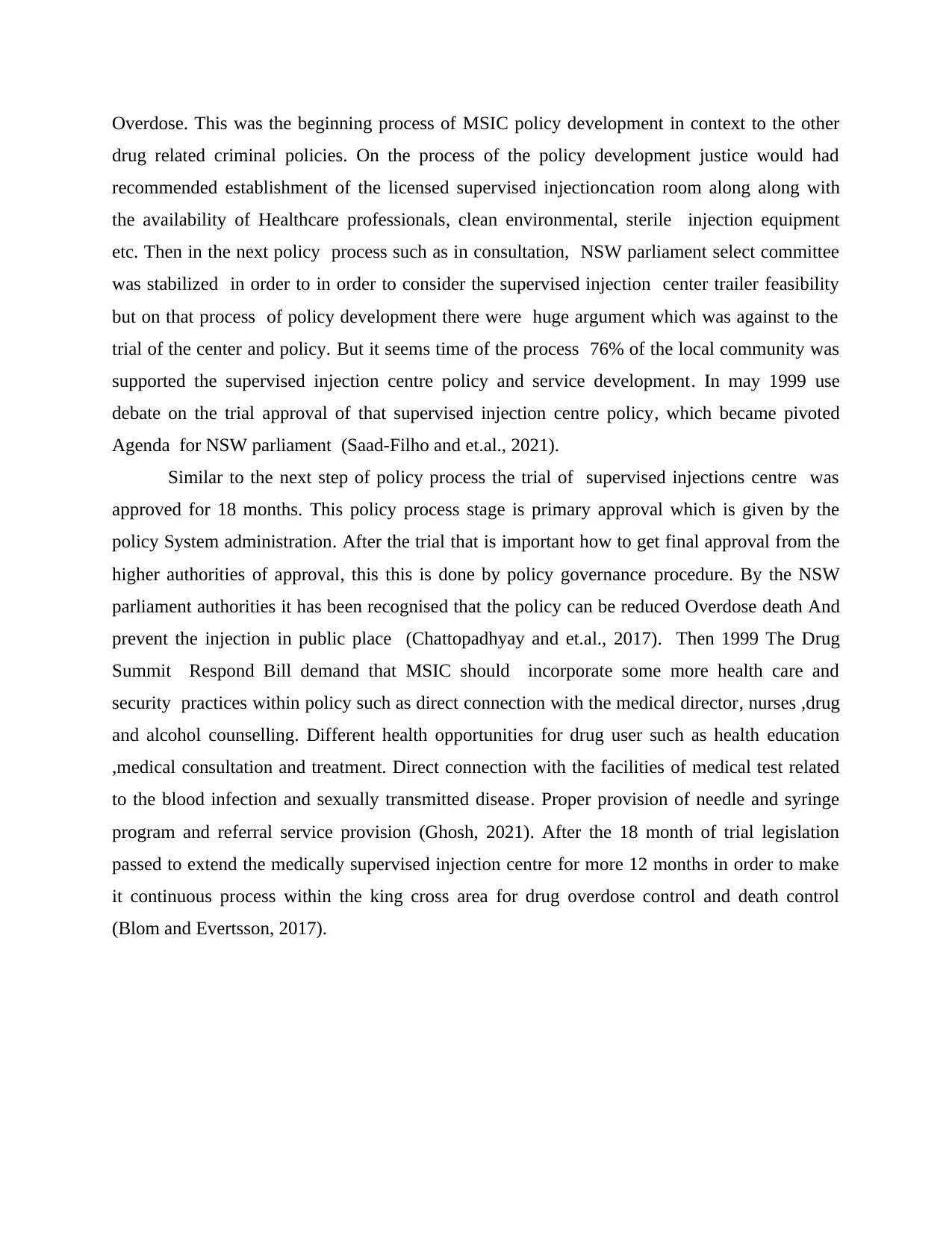
Overdose. This was the beginning process of MSIC policy development in context to the other
drug related criminal policies. On the process of the policy development justice would had
recommended establishment of the licensed supervised injectioncation room along along with
the availability of Healthcare professionals, clean environmental, sterile injection equipment
etc. Then in the next policy process such as in consultation, NSW parliament select committee
was stabilized in order to in order to consider the supervised injection center trailer feasibility
but on that process of policy development there were huge argument which was against to the
trial of the center and policy. But it seems time of the process 76% of the local community was
supported the supervised injection centre policy and service development. In may 1999 use
debate on the trial approval of that supervised injection centre policy, which became pivoted
Agenda for NSW parliament (Saad-Filho and et.al., 2021).
Similar to the next step of policy process the trial of supervised injections centre was
approved for 18 months. This policy process stage is primary approval which is given by the
policy System administration. After the trial that is important how to get final approval from the
higher authorities of approval, this this is done by policy governance procedure. By the NSW
parliament authorities it has been recognised that the policy can be reduced Overdose death And
prevent the injection in public place (Chattopadhyay and et.al., 2017). Then 1999 The Drug
Summit Respond Bill demand that MSIC should incorporate some more health care and
security practices within policy such as direct connection with the medical director, nurses ,drug
and alcohol counselling. Different health opportunities for drug user such as health education
,medical consultation and treatment. Direct connection with the facilities of medical test related
to the blood infection and sexually transmitted disease. Proper provision of needle and syringe
program and referral service provision (Ghosh, 2021). After the 18 month of trial legislation
passed to extend the medically supervised injection centre for more 12 months in order to make
it continuous process within the king cross area for drug overdose control and death control
(Blom and Evertsson, 2017).
drug related criminal policies. On the process of the policy development justice would had
recommended establishment of the licensed supervised injectioncation room along along with
the availability of Healthcare professionals, clean environmental, sterile injection equipment
etc. Then in the next policy process such as in consultation, NSW parliament select committee
was stabilized in order to in order to consider the supervised injection center trailer feasibility
but on that process of policy development there were huge argument which was against to the
trial of the center and policy. But it seems time of the process 76% of the local community was
supported the supervised injection centre policy and service development. In may 1999 use
debate on the trial approval of that supervised injection centre policy, which became pivoted
Agenda for NSW parliament (Saad-Filho and et.al., 2021).
Similar to the next step of policy process the trial of supervised injections centre was
approved for 18 months. This policy process stage is primary approval which is given by the
policy System administration. After the trial that is important how to get final approval from the
higher authorities of approval, this this is done by policy governance procedure. By the NSW
parliament authorities it has been recognised that the policy can be reduced Overdose death And
prevent the injection in public place (Chattopadhyay and et.al., 2017). Then 1999 The Drug
Summit Respond Bill demand that MSIC should incorporate some more health care and
security practices within policy such as direct connection with the medical director, nurses ,drug
and alcohol counselling. Different health opportunities for drug user such as health education
,medical consultation and treatment. Direct connection with the facilities of medical test related
to the blood infection and sexually transmitted disease. Proper provision of needle and syringe
program and referral service provision (Ghosh, 2021). After the 18 month of trial legislation
passed to extend the medically supervised injection centre for more 12 months in order to make
it continuous process within the king cross area for drug overdose control and death control
(Blom and Evertsson, 2017).
Secure Best Marks with AI Grader
Need help grading? Try our AI Grader for instant feedback on your assignments.
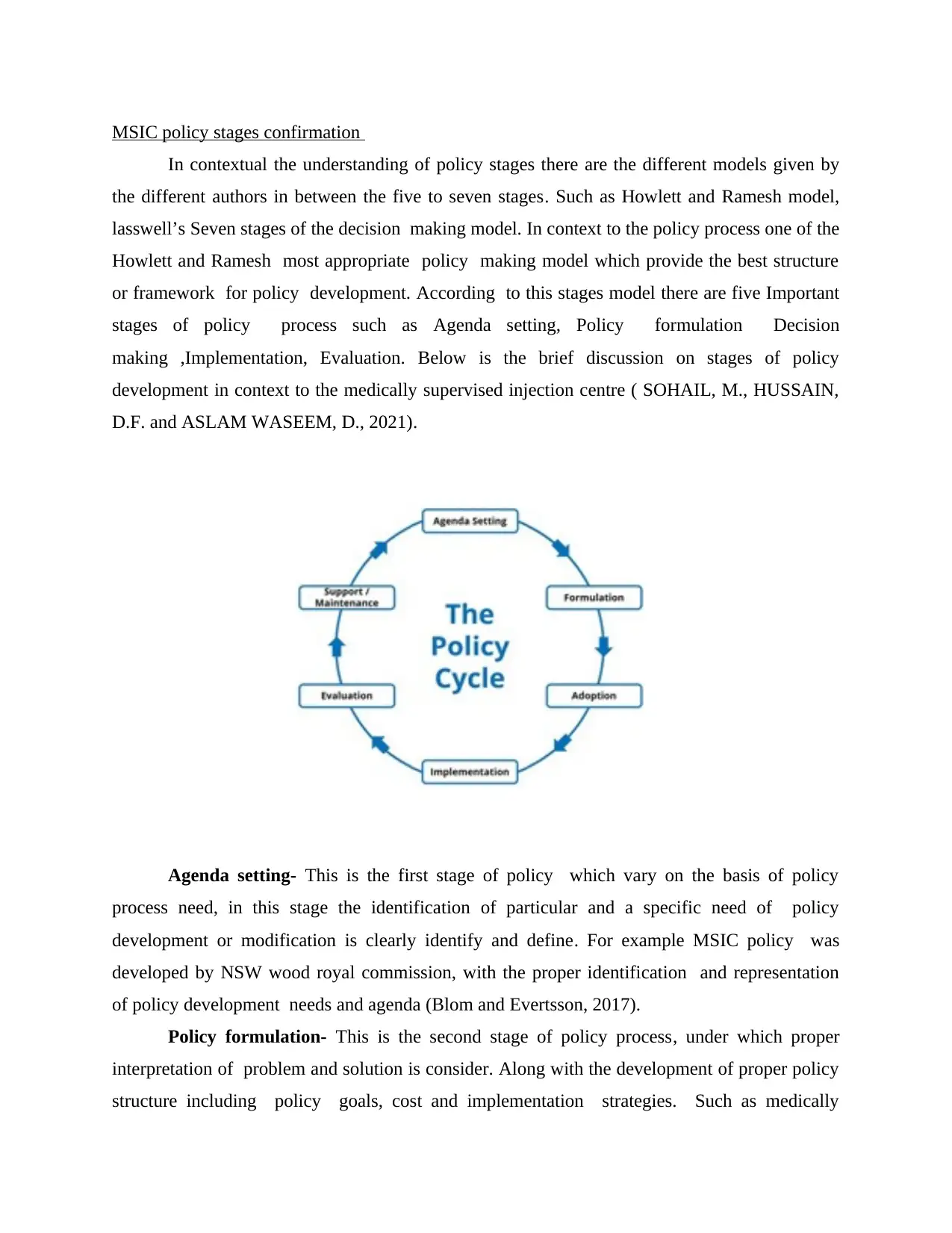
MSIC policy stages confirmation
In contextual the understanding of policy stages there are the different models given by
the different authors in between the five to seven stages. Such as Howlett and Ramesh model,
lasswell’s Seven stages of the decision making model. In context to the policy process one of the
Howlett and Ramesh most appropriate policy making model which provide the best structure
or framework for policy development. According to this stages model there are five Important
stages of policy process such as Agenda setting, Policy formulation Decision
making ,Implementation, Evaluation. Below is the brief discussion on stages of policy
development in context to the medically supervised injection centre ( SOHAIL, M., HUSSAIN,
D.F. and ASLAM WASEEM, D., 2021).
Agenda setting- This is the first stage of policy which vary on the basis of policy
process need, in this stage the identification of particular and a specific need of policy
development or modification is clearly identify and define. For example MSIC policy was
developed by NSW wood royal commission, with the proper identification and representation
of policy development needs and agenda (Blom and Evertsson, 2017).
Policy formulation- This is the second stage of policy process, under which proper
interpretation of problem and solution is consider. Along with the development of proper policy
structure including policy goals, cost and implementation strategies. Such as medically
In contextual the understanding of policy stages there are the different models given by
the different authors in between the five to seven stages. Such as Howlett and Ramesh model,
lasswell’s Seven stages of the decision making model. In context to the policy process one of the
Howlett and Ramesh most appropriate policy making model which provide the best structure
or framework for policy development. According to this stages model there are five Important
stages of policy process such as Agenda setting, Policy formulation Decision
making ,Implementation, Evaluation. Below is the brief discussion on stages of policy
development in context to the medically supervised injection centre ( SOHAIL, M., HUSSAIN,
D.F. and ASLAM WASEEM, D., 2021).
Agenda setting- This is the first stage of policy which vary on the basis of policy
process need, in this stage the identification of particular and a specific need of policy
development or modification is clearly identify and define. For example MSIC policy was
developed by NSW wood royal commission, with the proper identification and representation
of policy development needs and agenda (Blom and Evertsson, 2017).
Policy formulation- This is the second stage of policy process, under which proper
interpretation of problem and solution is consider. Along with the development of proper policy
structure including policy goals, cost and implementation strategies. Such as medically
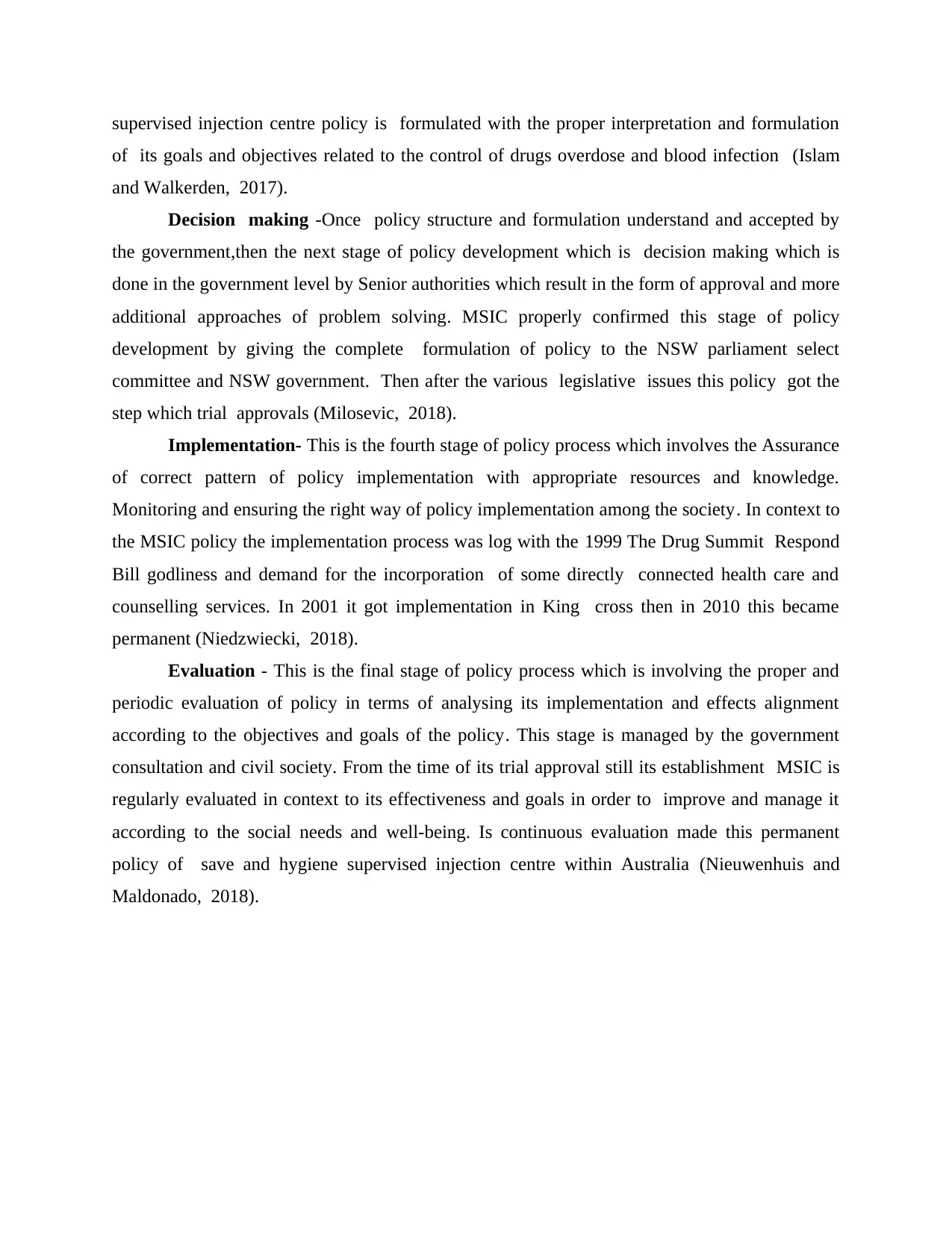
supervised injection centre policy is formulated with the proper interpretation and formulation
of its goals and objectives related to the control of drugs overdose and blood infection (Islam
and Walkerden, 2017).
Decision making -Once policy structure and formulation understand and accepted by
the government,then the next stage of policy development which is decision making which is
done in the government level by Senior authorities which result in the form of approval and more
additional approaches of problem solving. MSIC properly confirmed this stage of policy
development by giving the complete formulation of policy to the NSW parliament select
committee and NSW government. Then after the various legislative issues this policy got the
step which trial approvals (Milosevic, 2018).
Implementation- This is the fourth stage of policy process which involves the Assurance
of correct pattern of policy implementation with appropriate resources and knowledge.
Monitoring and ensuring the right way of policy implementation among the society. In context to
the MSIC policy the implementation process was log with the 1999 The Drug Summit Respond
Bill godliness and demand for the incorporation of some directly connected health care and
counselling services. In 2001 it got implementation in King cross then in 2010 this became
permanent (Niedzwiecki, 2018).
Evaluation - This is the final stage of policy process which is involving the proper and
periodic evaluation of policy in terms of analysing its implementation and effects alignment
according to the objectives and goals of the policy. This stage is managed by the government
consultation and civil society. From the time of its trial approval still its establishment MSIC is
regularly evaluated in context to its effectiveness and goals in order to improve and manage it
according to the social needs and well-being. Is continuous evaluation made this permanent
policy of save and hygiene supervised injection centre within Australia (Nieuwenhuis and
Maldonado, 2018).
of its goals and objectives related to the control of drugs overdose and blood infection (Islam
and Walkerden, 2017).
Decision making -Once policy structure and formulation understand and accepted by
the government,then the next stage of policy development which is decision making which is
done in the government level by Senior authorities which result in the form of approval and more
additional approaches of problem solving. MSIC properly confirmed this stage of policy
development by giving the complete formulation of policy to the NSW parliament select
committee and NSW government. Then after the various legislative issues this policy got the
step which trial approvals (Milosevic, 2018).
Implementation- This is the fourth stage of policy process which involves the Assurance
of correct pattern of policy implementation with appropriate resources and knowledge.
Monitoring and ensuring the right way of policy implementation among the society. In context to
the MSIC policy the implementation process was log with the 1999 The Drug Summit Respond
Bill godliness and demand for the incorporation of some directly connected health care and
counselling services. In 2001 it got implementation in King cross then in 2010 this became
permanent (Niedzwiecki, 2018).
Evaluation - This is the final stage of policy process which is involving the proper and
periodic evaluation of policy in terms of analysing its implementation and effects alignment
according to the objectives and goals of the policy. This stage is managed by the government
consultation and civil society. From the time of its trial approval still its establishment MSIC is
regularly evaluated in context to its effectiveness and goals in order to improve and manage it
according to the social needs and well-being. Is continuous evaluation made this permanent
policy of save and hygiene supervised injection centre within Australia (Nieuwenhuis and
Maldonado, 2018).
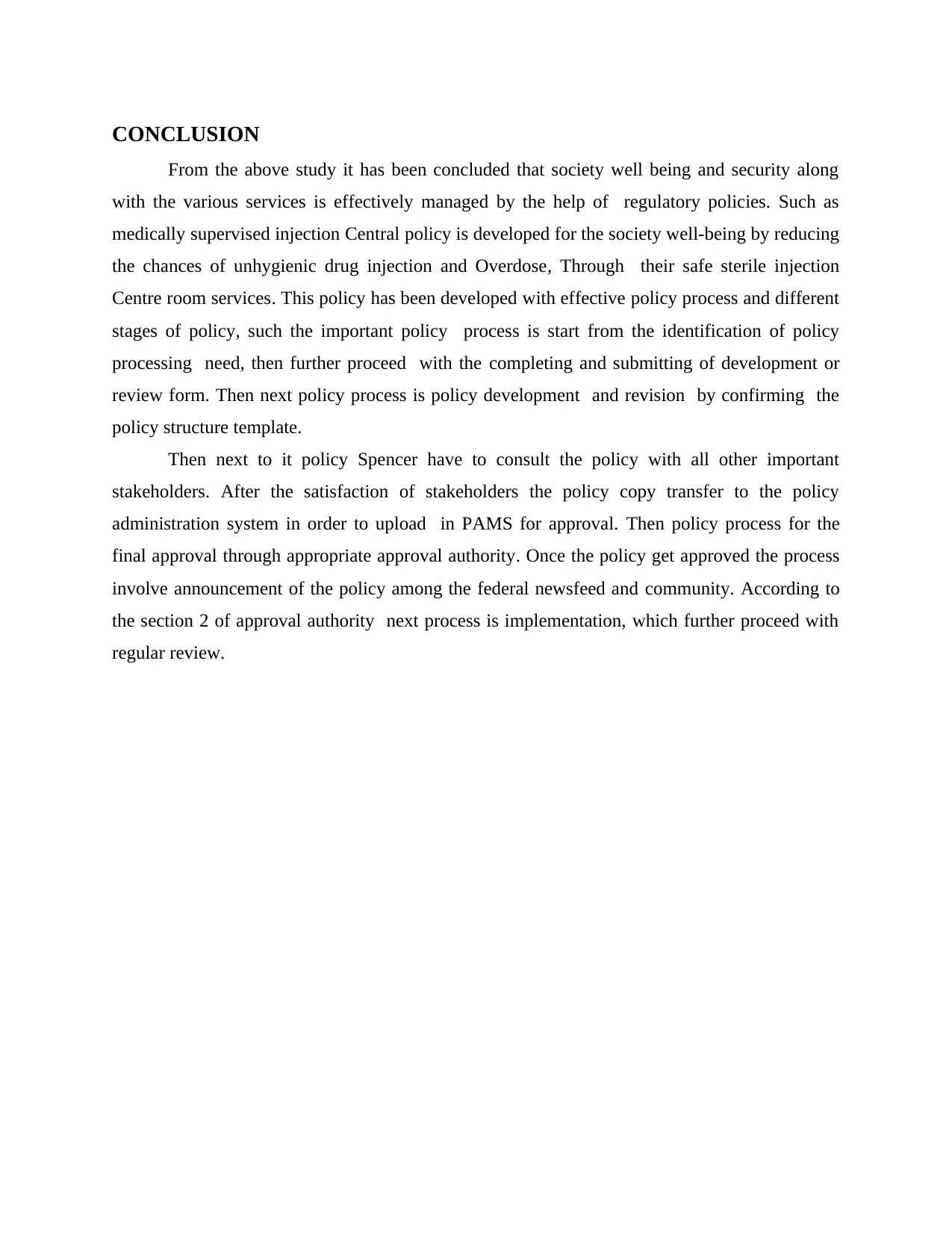
CONCLUSION
From the above study it has been concluded that society well being and security along
with the various services is effectively managed by the help of regulatory policies. Such as
medically supervised injection Central policy is developed for the society well-being by reducing
the chances of unhygienic drug injection and Overdose, Through their safe sterile injection
Centre room services. This policy has been developed with effective policy process and different
stages of policy, such the important policy process is start from the identification of policy
processing need, then further proceed with the completing and submitting of development or
review form. Then next policy process is policy development and revision by confirming the
policy structure template.
Then next to it policy Spencer have to consult the policy with all other important
stakeholders. After the satisfaction of stakeholders the policy copy transfer to the policy
administration system in order to upload in PAMS for approval. Then policy process for the
final approval through appropriate approval authority. Once the policy get approved the process
involve announcement of the policy among the federal newsfeed and community. According to
the section 2 of approval authority next process is implementation, which further proceed with
regular review.
From the above study it has been concluded that society well being and security along
with the various services is effectively managed by the help of regulatory policies. Such as
medically supervised injection Central policy is developed for the society well-being by reducing
the chances of unhygienic drug injection and Overdose, Through their safe sterile injection
Centre room services. This policy has been developed with effective policy process and different
stages of policy, such the important policy process is start from the identification of policy
processing need, then further proceed with the completing and submitting of development or
review form. Then next policy process is policy development and revision by confirming the
policy structure template.
Then next to it policy Spencer have to consult the policy with all other important
stakeholders. After the satisfaction of stakeholders the policy copy transfer to the policy
administration system in order to upload in PAMS for approval. Then policy process for the
final approval through appropriate approval authority. Once the policy get approved the process
involve announcement of the policy among the federal newsfeed and community. According to
the section 2 of approval authority next process is implementation, which further proceed with
regular review.
Paraphrase This Document
Need a fresh take? Get an instant paraphrase of this document with our AI Paraphraser
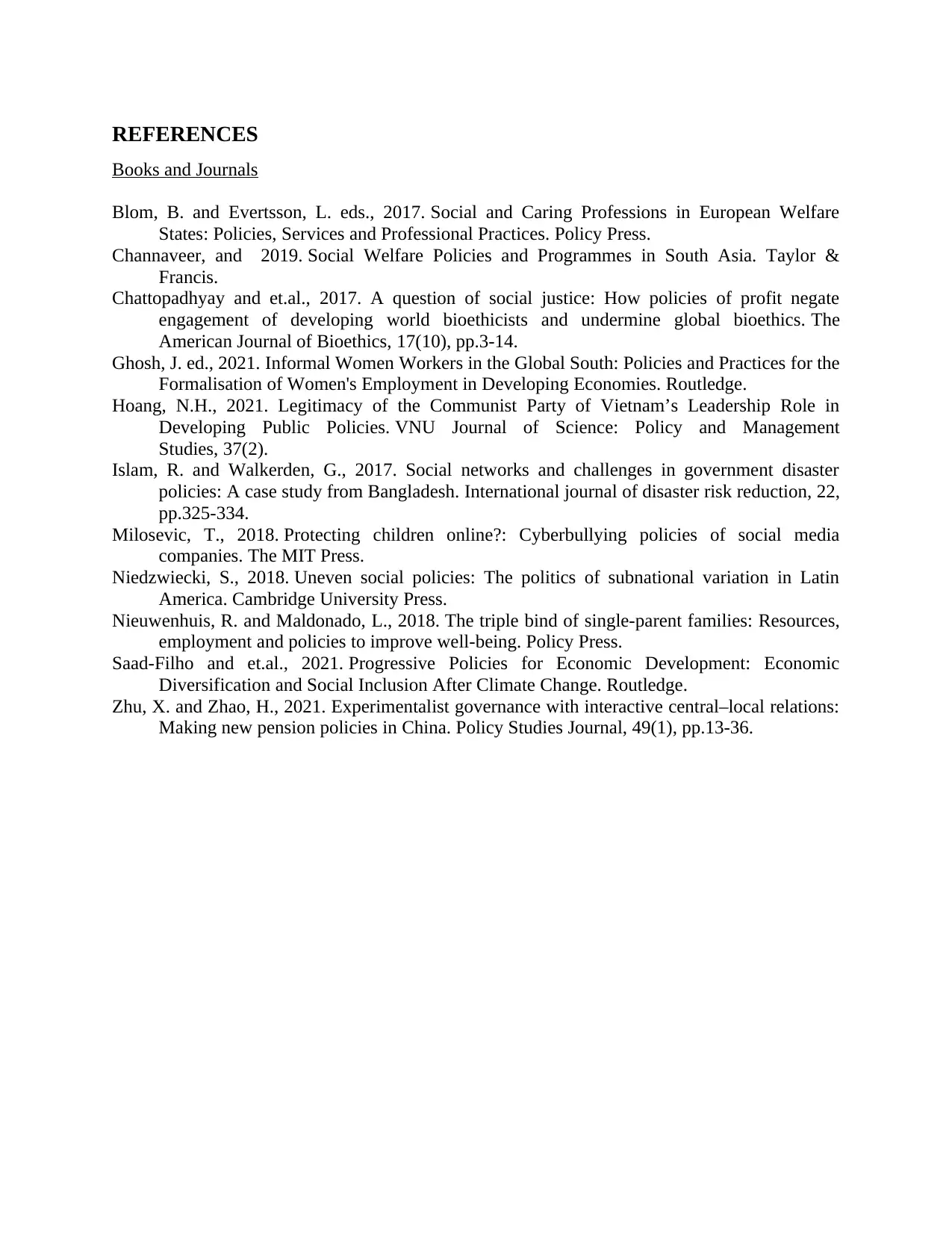
REFERENCES
Books and Journals
Blom, B. and Evertsson, L. eds., 2017. Social and Caring Professions in European Welfare
States: Policies, Services and Professional Practices. Policy Press.
Channaveer, and 2019. Social Welfare Policies and Programmes in South Asia. Taylor &
Francis.
Chattopadhyay and et.al., 2017. A question of social justice: How policies of profit negate
engagement of developing world bioethicists and undermine global bioethics. The
American Journal of Bioethics, 17(10), pp.3-14.
Ghosh, J. ed., 2021. Informal Women Workers in the Global South: Policies and Practices for the
Formalisation of Women's Employment in Developing Economies. Routledge.
Hoang, N.H., 2021. Legitimacy of the Communist Party of Vietnam’s Leadership Role in
Developing Public Policies. VNU Journal of Science: Policy and Management
Studies, 37(2).
Islam, R. and Walkerden, G., 2017. Social networks and challenges in government disaster
policies: A case study from Bangladesh. International journal of disaster risk reduction, 22,
pp.325-334.
Milosevic, T., 2018. Protecting children online?: Cyberbullying policies of social media
companies. The MIT Press.
Niedzwiecki, S., 2018. Uneven social policies: The politics of subnational variation in Latin
America. Cambridge University Press.
Nieuwenhuis, R. and Maldonado, L., 2018. The triple bind of single-parent families: Resources,
employment and policies to improve well-being. Policy Press.
Saad-Filho and et.al., 2021. Progressive Policies for Economic Development: Economic
Diversification and Social Inclusion After Climate Change. Routledge.
Zhu, X. and Zhao, H., 2021. Experimentalist governance with interactive central–local relations:
Making new pension policies in China. Policy Studies Journal, 49(1), pp.13-36.
Books and Journals
Blom, B. and Evertsson, L. eds., 2017. Social and Caring Professions in European Welfare
States: Policies, Services and Professional Practices. Policy Press.
Channaveer, and 2019. Social Welfare Policies and Programmes in South Asia. Taylor &
Francis.
Chattopadhyay and et.al., 2017. A question of social justice: How policies of profit negate
engagement of developing world bioethicists and undermine global bioethics. The
American Journal of Bioethics, 17(10), pp.3-14.
Ghosh, J. ed., 2021. Informal Women Workers in the Global South: Policies and Practices for the
Formalisation of Women's Employment in Developing Economies. Routledge.
Hoang, N.H., 2021. Legitimacy of the Communist Party of Vietnam’s Leadership Role in
Developing Public Policies. VNU Journal of Science: Policy and Management
Studies, 37(2).
Islam, R. and Walkerden, G., 2017. Social networks and challenges in government disaster
policies: A case study from Bangladesh. International journal of disaster risk reduction, 22,
pp.325-334.
Milosevic, T., 2018. Protecting children online?: Cyberbullying policies of social media
companies. The MIT Press.
Niedzwiecki, S., 2018. Uneven social policies: The politics of subnational variation in Latin
America. Cambridge University Press.
Nieuwenhuis, R. and Maldonado, L., 2018. The triple bind of single-parent families: Resources,
employment and policies to improve well-being. Policy Press.
Saad-Filho and et.al., 2021. Progressive Policies for Economic Development: Economic
Diversification and Social Inclusion After Climate Change. Routledge.
Zhu, X. and Zhao, H., 2021. Experimentalist governance with interactive central–local relations:
Making new pension policies in China. Policy Studies Journal, 49(1), pp.13-36.
1 out of 8
Your All-in-One AI-Powered Toolkit for Academic Success.
+13062052269
info@desklib.com
Available 24*7 on WhatsApp / Email
![[object Object]](/_next/static/media/star-bottom.7253800d.svg)
Unlock your academic potential
© 2024 | Zucol Services PVT LTD | All rights reserved.

